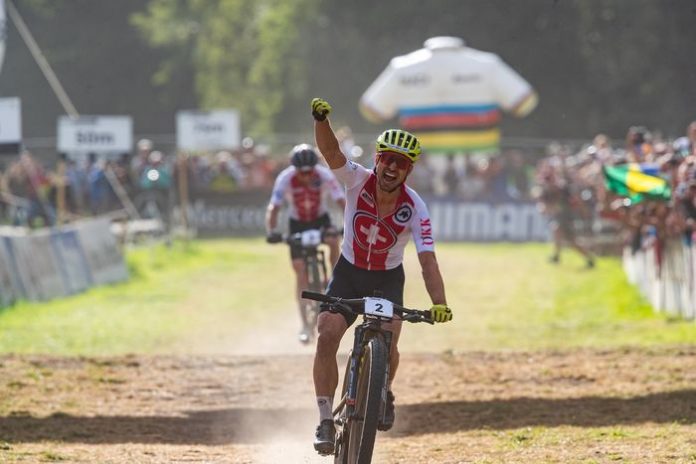This was Sunday. Schurter was in a car—for once, not on his bike—heading home from an appearance on Swiss television, a little more than 24 hours after winning yet another mountain bike World Championship, this one in Val di Sole, Italy.
It was Schurter’s ninth (ninth!) men’s elite cross-country world title—an unprecedented feat which underlined the sublime talent and longevity of the legendary 35-year-old rider, whose name may not be globally recognized like a Lionel Messi, LeBron James, or Schurter’s Swiss countryman, Roger Federer, but who long ago established himself as one of the most dominant athletes on the planet.
No. 9 felt like an exclamation point. Schurter’s coach, the Swiss mountain bike pioneer Thomas Frischknecht, better known as “Frischi,” called it “a polite reminder that Nino is still the all-time best mountain biker in the world.”
Frichi’s hardly unbiased here, but a case can definitely be made. Schurter has now won the men’s elite XCO world title in 2009, 2012, 2013, 2015, 2016, 2017, 2018, 2019 and 2021. He owns World Cup victories by the barrel, and took home the gold medal at the Summer Olympics in Rio in 2016 to go along with his silver at London 2012 and a bronze at Beijing 2008.
In a relentless sport of climbs, twists, jumps and rock-strewn fields gently rebranded as “gardens,” Schurter is a supremely skillful rider, able to glide through hazardous “technical” sections and also win high-speed sprints. Mountain biking is a discipline that constantly evolves, in race formats and technology—the bikes Schurter rode as a youngster may seem like crude instruments compared to today’s ethereal machines—but he continues to hold it in his spell.
“One of the most hard-working, humble and generous athletes I’ve ever known,” said Kate Courtney, the 2018 women’s mountain bike world champion from Marin County, and Schurter’s teammate on the Scott-Sram pro team. “To see that he can continue to evolve and surprise himself at this point in his career is truly inspirational.”
In 2008 Schurter became the youngest man (age 22) to win the men’s world XCO title. Now he’s the oldest, which seemed to amuse him.
“I didn’t know,” he said. “I crossed the finish line and someone told me. It’s nice. It [makes me] feel a bit old, but it’s also a big honor.”
His win at Val di Sole, which followed Evie Richards of Great Britain’s dominant solo victory in the women’s cross-country race, was a crafty triumph. In the final lap, Schurter was locked in a 1-2 duel with his Swiss teammate, Mathias Flueckiger. Flueckiger seemed to be the stronger rider, on his way to victory, until Schurter took a wickedly sharp inside line on a turn and surged ahead, capturing the final sprint.
“When it counts, he’s still got it,” said an admiring Frischknecht.
It was a milestone victory after a challenging year. Schurter had not won a World Cup event this season, and he finished fourth in the Olympics at Tokyo—not a bad result, but off the medal podium.
“It was not the way I wanted it to be,” he said. “But I knew if I got everything together, I could be at the very top.”
Mountain biking is amid an energetic moment. Schurter, once the precocious rival to a similarly dominant MTB titan, France’s Julien Absalon, now is the elder battling a ferocious crop of young talent, including Tom Pidcock, the 22-year-old from Great Britain who won gold in Tokyo, as well as Mathieu van der Poel, the 26-year-old Dutch sensation who, like Pidcock, also races on the road and in the hybrid sport of cyclocross. Neither man was in Saturday’s race—van der Poel is still recovering from injuries he suffered in a crash during the Olympic race, and Pidcock is currently riding with his pro team in the Vuelta a Espana road stage race.
Schurter is enthusiastic about the surge in fresh talent. “It’s great to have those guys,” he said. “It brings some new attention from different disciplines and it’s great for the sport.”
Schurter also sounded upbeat about what he’s seeing from the U.S., the birthplace of the off-road phenomenon. Courtney, who grew up at the foot of Mount Tamalpais, where early swashbucklers once rode “paperboy” bikes down the slopes, was part of a U.S. relay team that captured a silver medal at worlds. Her relay teammate, Christopher Blevins, a 23-year-old from Durango, Colo., then won gold in the men’s “short track” race—and also a bronze in the nascent “e-bike” mountain bike competition. Schurter also had praise for another Durango phenom, 19-year-old Riley Amos.
“It’s great to see the sport is coming on again in the U.S.,” he said.

Nino Schurter reacts at the finish line.
Photo: Javier MartíNez De La Puente/NurPhoto/Zuma Press
As for his own longevity, Schurter attributed much of it to his ability to recharge and take a break. Each off-season, there will be a stretch in which he will not touch his bike at all.
“I always take time for physical rest, but also some mental rest,” he said. “High performance sports are sometimes tough on your mind. All of a sudden, you’re facing things you don’t like, or you don’t have fun anymore. And I always try to keep it fun.”
He’s still having fun. I asked Schurter what he loved about his mountain biking.
“It’s a sport you can just do,” he said. “You can go out of your house and it just starts where you are. You don’t need a venue. You just go. And then, training in nature—like a nice trail somewhere in the forest…it’s a great feeling, a feeling of freedom, of joy.
“That’s what I really enjoy,” the King of Mountain Biking said. “And probably will for my entire life.”
SHARE YOUR THOUGHTS
What do you think about Nino Schurter’s impact on mountain biking—and the rise of young talent?
Write to Jason Gay at Jason.Gay@wsj.com
Copyright ©2021 Dow Jones & Company, Inc. All Rights Reserved. 87990cbe856818d5eddac44c7b1cdeb8








